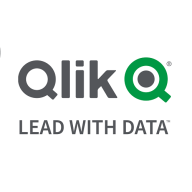

Informatica PowerCenter and Qlik Replicate are both prominent in the data integration category, offering solutions for enterprise data management. While PowerCenter is robust in features, Qlik Replicate stands out for its ease and flexibility, making it a preferred choice for modern environments.
Features: Informatica PowerCenter offers extensive data transformations, a variety of connectors, and advanced data quality features. It provides debugging capabilities for error handling and supports modular transformations. Qlik Replicate emphasizes real-time replication and change data capture, offering quick data integration with minimal latency, comprehensive connector support, and user-friendly interface for seamless data movement.
Room for Improvement: Informatica PowerCenter could enhance user-friendliness in setup and maintenance, provide more flexible real-time replication options, and reduce complexity for entry-level users. Qlik Replicate might improve its AI capabilities, offer more advanced transformation features, and integrate better with non-standard data structures to match market needs.
Ease of Deployment and Customer Service: Qlik Replicate is lauded for its straightforward, time-efficient deployment and effective customer service, making it a go-to for rapid deployment needs. Informatica PowerCenter, while offering more extensive service support, involves a complex setup process requiring more resources.
Pricing and ROI: Informatica PowerCenter generally entails a higher initial cost with a longer ROI due to its extensive feature set and deployment complexity. Qlik Replicate offers competitive pricing with quicker ROI, appealing to organizations prioritizing cost efficiency and immediate results.
I conducted a cost comparison with the AWS service provider, and this option is much cheaper than the Kinesis service offered by AWS.
I like the technical support provided by Informatica.
Even priority tickets, which should be resolved in minutes, can take days.
Informatica PowerCenter is stable and can scale well.
Utilizing more stored procedures from Oracle databases in an easy way would significantly boost performance.
It is a core-based licensing, which, especially in the banking industry, results in the system capacity being utilized up to a maximum of 60%.
I find that the pricing and licensing for Informatica PowerCenter align with its quality.
Licensing is calculated based on the machine's total capacity rather than actual usage.
The system supports real-time integration, which is essential for many of my tasks.
Data retrieved from the system can be pushed to multiple places, supporting various divisions such as marketing, loans, and others.


Informatica PowerCenter is a data integration and data visualization tool. The solution works as an enterprise data integration platform that helps organizations access, transform, and integrate data from various systems. The product is designed to support companies in the full cycle of a project, from its initial rollout to critical deployments. Informatica PowerCenter allows developers and analysts to collaborate while accelerating the work process to deploy projects within days instead of months.
The Advanced edition of the product provides an additional real-time engine which allows companies to have always-on enterprise data integration. This ensures seamless collaboration and increment of data lineage visibility and impacts analysis.
The Premium edition of the solution offers an early warning system that detects unexpected behaviors or incorrect utilization of resources in the workflows and alerts companies in the case that these occur. This version of the product also offers automatic data validation, which ensures data accuracy and reduces testing time and expenditure of resources for by up to 90%.
Informatica PowerCenter Features
The product provides users with various features which allow them to execute data integration initiatives such as analytics, data warehousing, data governance, consolidation, and application migration. The features of the solution include:
Informatica PowerCenter Benefits
The benefits of using Informatica PowerCenter include:
Reviews from Real Users
Yahya T., a developer and architect at L'Oreal, says the product is stable, provides good support, and integrating it with other systems is very fast.
Mohamed E., a senior manager for Data management and data governance at a tech company, says PowerCenter is stable, mature, and offers flexibility in building the pipeline and has a drag-and-drop mode because it's GUI-based; technical support is brilliant.
Qlik Replicate is a data replication solution for replicating data from one source database to another for business intelligence software. It offers data manipulation and transformations, replication without impacting source databases, and ease of use without needing ETL. The solution is stable and user-friendly, with detailed logging and support.
Qlik Replicate has improved the organization by allowing each team to replicate their data into a single-source data location. The most important feature of Qlik Replicate is its ability to replicate and update records without needing a programmer.
We monitor all Data Integration reviews to prevent fraudulent reviews and keep review quality high. We do not post reviews by company employees or direct competitors. We validate each review for authenticity via cross-reference with LinkedIn, and personal follow-up with the reviewer when necessary.